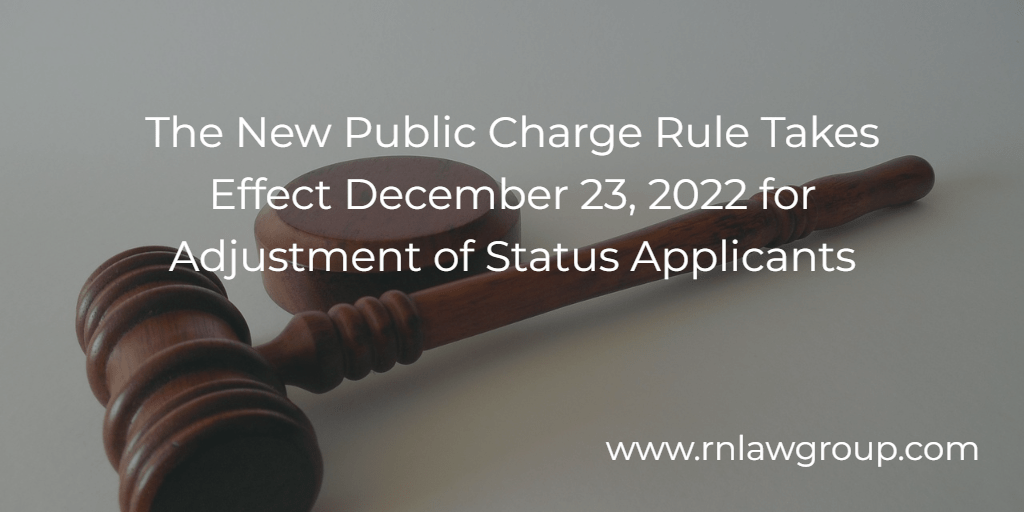
The New Public Charge Rule Takes Effect December 23, 2022 for Adjustment of Status Applicants
The Public Charge ground of inadmissibility was rarely discussed in the employment-based immigration realm as most employment-based adjustment of status applicants were employed and therefore unlikely to become a public charge. That changed in 2019 when the Trump administration attempted to implement new regulations requiring all adjustment of status applicants to provide credit reports, health insurance, and financial documents, answer new questions on the I-485 form regarding the use of public benefits, and file a new I-944 Declaration of Self-Sufficiency form. The regulation was ultimately struck down by courts removing these additional requirements.
However, a new regulation takes effect December 23, 2022 and again implements new questions on the I-485 form for all Adjustment of Status applicants. The difference this time around is that employment-based applicants do not need to provide any additional financial documents or complete any additional forms under the new rule. They will need to disclose the size of their household, the annual household income, value of household assets, value of household liabilities, and education background. With this information, employment-based applicants should generally be able to demonstrate that they are not inadmissible under the public charge rule.
The new version of the I-485 form also asks whether the applicant ever received certain public benefits, including Supplemental Security Income (SSI), Temporary Assistance for Needy Families (TANF), or State, Tribal, territorial, or local, cash benefit programs for income maintenance or long-term institutionalization at government expense.
Employment-based applicants often wonder if a benefit they are receiving is considered a “public benefit” that could disqualify them from receiving a green card. In most cases, the answer is no. Employment-based applicants for adjustment of status are usually present in the United States pursuant to a nonimmigrant visa. Individuals on nonimmigrant visas are usually not eligible for the type of public assistance that is prohibited by the public charge rule. Agencies offering public benefits are typically required to verify immigration status before providing benefits. Therefore, it is unlikely that an employment-based nonimmigrant in the U.S. would ever receive the type of public assistance that would make them ineligible for permanent residence.
USCIS does not consider any of the following public benefits when making a public charge determination:
Nutrition programs
- Supplemental Nutrition Assistance Program (SNAP) or other nutrition programs
- Special Supplemental Nutrition Program for Women, Infants, and Children (WIC)
- School lunch and school breakfast programs
- Benefits under the Emergency Food Assistance Act (TEFAP)
- Child and Adult Care Food Program (CACFP)
- Food Distribution Program on Indian Reservations (FDPIR)
Health programs
- Children’s Health Insurance Program (CHIP)
- Medicaid (other than support for long-term institutional care), including public assistance for immunizations and for testing and treatment of symptoms of communicable diseases, health clinics, short-term rehabilitation services, and emergency medical services
- Health Insurance through the Affordable Care Act
- Any benefits related to immunizations or testing for communicable diseases
- Treatments or preventative services related to COVID-19, including vaccinations
- Home and community-based services (HCBS)
Housing programs
- Housing benefits
- Housing assistance under the McKinney-Vento Homeless Assistance Act
Education and childcare programs
- Cash payments that are provided for childcare assistance or other supplemental, special purpose cash assistance
- Child care related services including the Child Care and Development Block Grant (CCDBG)
- Head Start
- Attending public school
- Student loans and home mortgage loan programs
- Publicly funded scholarships and educational grants
- Foster care and adoption benefits
Disaster relief programs
- Any services provided under the Stafford Act or comparable disaster assistance provided by state, tribal, territorial, or local governments
- Cash payments that are provided as part of pandemic or disaster relief funds, such as the American Rescue Plan Act
Earned benefits
- Social Security retirement benefits
- Government pensions
- Veterans’ benefits
- Unemployment insurance
Other public benefits
- Programs, services, or assistance (such as soup kitchens, crisis counseling and intervention, and short-term shelter) provided by local communities or through public or private nonprofit organizations
- Transportation vouchers or other non-cash transportation services
- Job training programs
- Energy assistance, such as the Low Income Home Energy Assistance Program (LIHEAP)
- Guaranteed income programs that are not equivalent to public cash assistance for income maintenance
- Child Tax Credit (CTC) or other tax-related cash benefits including Earned Income Tax Credit (EITC); Additional Child Tax Credit (ACTC); Premium Tax Credit (PTC); Advance Payment of Premium Tax Credit (APTC); and State, local, or tribal tax credit
- Public assistance for COVID-19 testing, vaccinations, or treatment
- Other COVID-19 assistance, such as food, housing, cash assistance, rental assistance, tax credits, stimulus payments, unemployment, financial aid grants to students, Paycheck Protection Program, or student loan forbearance
By: Emily Neumann
Emily Neumann is Managing Partner at Reddy Neumann Brown PC with over 15 years of experience practicing US immigration law providing services to U.S. businesses and multinational corporations. Emily has helped transform the firm from a solo practice to Houston’s largest immigration law firm focused exclusively on U.S. employment-based immigration. She received her Bachelor’s degree in Biology from Central Michigan University and her Juris Doctorate degree from the University of Houston Law Center. Emily has been quoted in Bloomberg Law, U.S. News & World Report, Inside Higher Ed, and The Times of India on various hot topics in immigration. She is a member of the American Immigration Lawyers Association and Society for Human Resource Management.
In today’s global economy, being able to navigate the immigration process is critical to your business success. If you are interested in adjustment of status or U.S. work visas, speak with one of our immigration lawyers. Please contact us online, call our Houston business immigration attorney office directly at 713-953-7787, or schedule a consultation.

